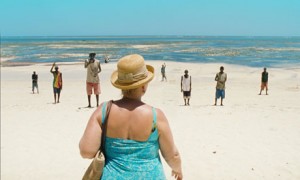STUDIO: Strand Releasing | DIRECTOR: Ulrich Seidl | CAST: Margarete Tiesel, Peter Kazungu, Inge Maux, Dunja Sowinetz, Helen Brugat, Gabriel Mwarua
BLU-RAY & DVD RELEASE DATE: 8/6/2013 | PRICE: DVD $27.99
BONUSES: photo gallery, trailers
SPECS: NR | 121 min. | Foreign language drama | widescreen | Dolby Digital 5.1 | English, German and Swahili with English subtitles
Ulrich Seidl’s (Import/Export) 2012 film drama, Paradise: Love might just be the most cynically-named film in the history of cinema. When Teresa (Margarethe Tiesel), a 50-year-old single mom from Austria, takes a holiday in Kenya, she’s hoping to find romance on a beautiful beach resort in an exotic locale. One grueling movie later, she and the audience have gone through a bleak and disturbing sexual journey through the human psyche, one that leaves you feeling despondent and more than a little soiled.
Which is not a criticism. In fact, the film is absolutely brilliant in its approach and execution. Originally conceived as one of three stories in a much longer film, Paradise: Love is now part one of a trilogy in which Seidl explores different women from one family. (The subsequent two are Paradise: Faith and this year’s Paradise: Hope.) Splitting the stories up was a wise move, as just sitting through this one is taxing enough. We get to observe Teresa’s journey from eager tourist to sugar mama through a string of sexual encounters with young African beach boys. For her, it’s a journey of self-discovery, but for them, it’s business-as-usual, frustrating Teresa with their brash, direct bedside approach: no foreplay, just sex in exchange for cash. Teresa complains to her friends at the resort—can’t someone treat her like a person, and not an object?
The rub, of course, is that this is exactly what whites have been doing to blacks for centuries. As an overweight, aging mom, Teresa exemplifies woman-as-victim of an advertising-driven world with impossible sexual ideals. She’s the oppressed; but as a rich, white person, she’s clearly the oppressor. She constantly speaks to the locals as if they were morons, enjoying plenty of laughs with her pals at their expense. The men, in the meantime, degrade and prostitute themselves in order to feed their families, at first handing Teresa the illusion she asks for, later demanding money for their many needs. Her feelings are hurt, sure, but how does that compare to what’s been done to their entire continent? The political aspects in play are difficult to reconcile and impossible to ignore.
There’s plenty of sex in the film, too, but none of it in any way titillating. Rather, it adds to the sense that we’re watching a nature documentary where the subject is the human animal in all of its complex behaviors. Alternating between two basic shooting styles, Seidl manages to craft a film that feels naturalistic and improvised, yet rehearsed and composed. When he locks the camera down in a Wes Anderson-like deadpan wide shot, he’s depicting the Africa we see in travel brochures- beautiful, serene, and totally fake. Compare that to the hand-held style Seidi reserves for the un-erotic sex scenes and third-world grit outside the resort. Static vs handheld, black vs white, beautiful vs ugly, man vs woman- the contrasts here are impossible to miss.
Paradise: Love manages to judge no one and everyone at the same time in a manner that only verité cinema can pull off. In an early, seemingly-innocent scene, Teresa tries to bribe monkey after monkey into sitting still in order to snap a quick photo; she fails to get the pic, but the monkeys always snag their banana. It’s a deceptively simple scene who’s meaning becomes all-too-clear by the end of the film. In Seidi’s view, Teresa, the Africans, the monkeys, you, and I all do whatever it takes to get by. Compassion has no room here, and “love” is just a word you use to get what you need.
|
Buy or Rent Paradise: Love
|
|||
|---|---|---|---|
DVD |
 DVD DVD |
 DVD DVD |
|

Leave a Reply